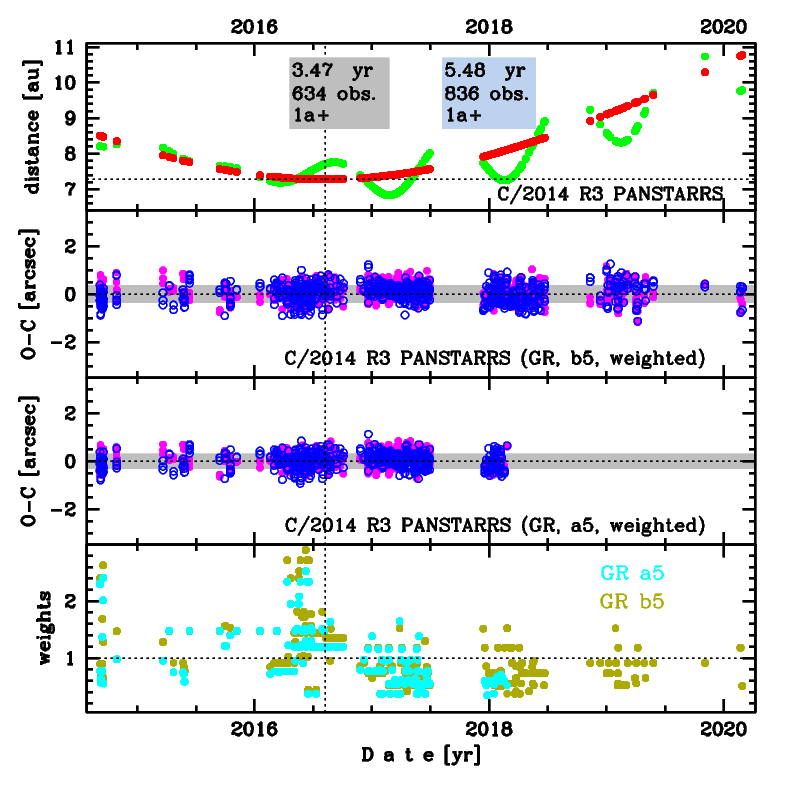C/2014 R3 PANSTARRS
more info
Comet C/2014 R3 was discovered on 6 September 2014 with Pan-STARRS 1 telescope (Haleakala), that is almost two years before its perihelion passage. This comet was observed until the end of February 2020.
Comet had its closest approach to the Earth on 24 February 2017 (6.829 au), about 6.5 months after its perihelion passage.
Solution given here is based on data spanning over 5.48 yr in a range of heliocentric distances: 8.51 au – 7.275 au (perihelion) – 8.51 au.
This marginally Oort spike comet suffers slight planetary perturbations during its passage through the planetary system; these perturbations lead to a more tight future orbit (see future barycentric orbits).
Comet had its closest approach to the Earth on 24 February 2017 (6.829 au), about 6.5 months after its perihelion passage.
Solution given here is based on data spanning over 5.48 yr in a range of heliocentric distances: 8.51 au – 7.275 au (perihelion) – 8.51 au.
This marginally Oort spike comet suffers slight planetary perturbations during its passage through the planetary system; these perturbations lead to a more tight future orbit (see future barycentric orbits).
| solution description | ||
|---|---|---|
| number of observations | 634 | |
| data interval | 2014 09 06 – 2018 02 25 | |
| data type | perihelion within the observation arc (FULL) | |
| data arc selection | entire data set (STD) | |
| range of heliocentric distances | 8.51 au – 7.28 au (perihelion) – 8.11 au | |
| detectability of NG effects in the comet's motion | NG effects not determinable | |
| type of model of motion | GR - gravitational orbit | |
| data weighting | YES | |
| number of residuals | 1255 | |
| RMS [arcseconds] | 0.32 | |
| orbit quality class | 1a+ | |
| orbital elements (barycentric ecliptic J2000) | ||
|---|---|---|
| Epoch | 2327 07 02 | |
| perihelion date | 2016 08 07.96834811 | ± 0.00068594 |
| perihelion distance [au] | 7.27356867 | ± 0.00000345 |
| eccentricity | 0.99885849 | ± 0.00000297 |
| argument of perihelion [°] | 113.373150 | ± 0.000047 |
| ascending node [°] | 334.060691 | ± 0.000010 |
| inclination [°] | 90.825788 | ± 0.000005 |
| reciprocal semi-major axis [10-6 au-1] | 156.94 | ± 0.41 |
| file containing 5001 VCs swarm |
|---|
| 2014r3a5.bpl |

Upper panel: Time distribution of positional observations with corresponding heliocentric (red curve) and geocentric (green curve) distance at which they were taken. The horizontal dotted line shows the perihelion distance for a given comet whereas vertical dotted line — the moment of perihelion passage.
Middle panel(s): O-C diagram for a given solution (sometimes in comparison to another solution available in CODE), where residuals in right ascension are shown using magenta dots and in declination by blue open circles.
Lowest panel: Relative weights for a given data set(s).
Middle panel(s): O-C diagram for a given solution (sometimes in comparison to another solution available in CODE), where residuals in right ascension are shown using magenta dots and in declination by blue open circles.
Lowest panel: Relative weights for a given data set(s).